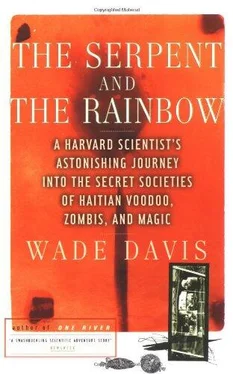Wade Davis - The Serpent and the Rainbow
Здесь есть возможность читать онлайн «Wade Davis - The Serpent and the Rainbow» весь текст электронной книги совершенно бесплатно (целиком полную версию без сокращений). В некоторых случаях можно слушать аудио, скачать через торрент в формате fb2 и присутствует краткое содержание. Год выпуска: 1985, Издательство: Simon & Schuster, Жанр: Старинная литература, на английском языке. Описание произведения, (предисловие) а так же отзывы посетителей доступны на портале библиотеки ЛибКат.
- Название:The Serpent and the Rainbow
- Автор:
- Издательство:Simon & Schuster
- Жанр:
- Год:1985
- ISBN:нет данных
- Рейтинг книги:5 / 5. Голосов: 1
-
Избранное:Добавить в избранное
- Отзывы:
-
Ваша оценка:
- 100
- 1
- 2
- 3
- 4
- 5
The Serpent and the Rainbow: краткое содержание, описание и аннотация
Предлагаем к чтению аннотацию, описание, краткое содержание или предисловие (зависит от того, что написал сам автор книги «The Serpent and the Rainbow»). Если вы не нашли необходимую информацию о книге — напишите в комментариях, мы постараемся отыскать её.
The Serpent and the Rainbow — читать онлайн бесплатно полную книгу (весь текст) целиком
Ниже представлен текст книги, разбитый по страницам. Система сохранения места последней прочитанной страницы, позволяет с удобством читать онлайн бесплатно книгу «The Serpent and the Rainbow», без необходимости каждый раз заново искать на чём Вы остановились. Поставьте закладку, и сможете в любой момент перейти на страницу, на которой закончили чтение.
Интервал:
Закладка:
But the death of the body brings other equally pressing concerns, for there are two possible causes of death, and the implications are profoundly different. Rarely, as in the case of an old man passing away in his sleep, a death may be considered natural, a call from God (mort bon Dieu) and beyond the influence of man. Unnatural deaths include all those we might label as “before one’s time,” and more often than not these result from the intervention of sorcery. And by vodoun definition, anyone who suffers an unnatural magical death may be raised as a zombi. At times it may be in the interest of the bokor to cause the unnatural death, and there are countless ways of doing so. But causing the unnatural death does not create a zombi; it just makes the victim immediately susceptible. Once this is understood, it becomes apparent that our entire investigation was based on an unwarranted assumption.
Since we knew that the zombi powders could pharmacologically induce a state of apparent death, we had all assumed that the bokors recognized an explicit cause-effect relationship between the powder and the resurrection from the grave. Clearly, I now realized, the vodounist did not necessarily consider it such a linear process. For them the creation of a zombi involved two only indirectly related events: the unnatural death and the graveyard ceremony. According to their beliefs, the powders just kill, and as in the case of any unnatural death the victim of the powder may be raised as a zombi. It is not the antidote or a powder that creates a zombi; it is the magical force of the bokor. That was why Herard Simon could rest assured that I would never understand zombis. I did not know the magic, and he himself did not know, nor did he believe that anyone would share those mysteries with me.
For the vodounist, then, zombis are created by sorcery, and it is the belief in the magic that makes the relatives of the dead concerned. For good reasons, they go to great efforts to ensure that the dead are truly dead, or at least protected from such a horrible fate. This is why the body may be killed again, with a knife through the heart or by decapitation. And this explains why seeds may be placed in the coffin so that whoever appears to take the body will be obliged to count them, a task that will take him perilously into the dawn.
To create a zombi, the bokor must capture the ti bon ange of the intended victim, a magical act that may be accomplished in a variety of ways. A particularly powerful bokor, for example, may through his spells gain control of the ti bon ange of a sailor who dies at sea or of a Haitian who is killed in a foreign land. Alternatively, the bokor may capture the ti bon ange of the living and hence indirectly cause the unnatural death: the individual, left without intelligence or will, slowly perishes. One way of thus capturing the ti bon ange is to spread poisons in the form of a cross on the threshold of the victim’s doorway. The magical skill of the bokor guarantees that only the victim will suffer. This, of course, was the service that LaBonté and Obin had offered me at Petite Rivière de Nippes. Yet a third means of gaining control of the ti bon ange is to capture it immediately following the death of the corps cadavre during the seven days that it hovers around the corpse. Hence the bokor may or may not be responsible for the unnatural death of the victim, and the ti bon ange may be captured by magic before or after the death of the corps cadavre.
Whatever the circumstances, the capture of the ti bon ange effects a split in the spiritual components of the victim and creates not one but two complementary kinds of zombis. That is what Herard had shown me. The spirit zombi, or the zombi of the ti bon ange alone, is carefully stored in a jar and may later be magically transmuted into insects, animals, or humans in order to accomplish the particular work of the bokor. The remaining spiritual components of man, the n’âme, the gros bon ange, and the z’étoile, together form the zombi cadavre, the zombi of the flesh.
Now the resurrection of the zombi cadavre in the graveyard requires a particularly sophisticated knowledge of magic. Above all, the bokor must prevent the transformations of the various spiritual components that would normally occur at the death of the body. First the ti bon ange—which may float above the body like a phosphorescent shadow—must be captured and prevented from reentering the victim. One way to assure this is to beat the victim violently, as occurred with Narcisse. Secondly, the gros bon ange must be prevented from returning to its source. Thirdly, the n’âme must be retained to keep the flesh from decaying. The zombi cadavre with its gros bon ange and n’âme can function; however, separated from the ti bon ange, the body is but an empty vessel, subject to the direction of the bokor or whoever maintains control of the zombi ti bon ange, Herard’s zombi astral. It is the notion of alien, malevolent forces thus taking control of the individual that is so terrifying to the vodounist. In Haiti, the fear is not of being harmed by zombis; it is fear of becoming one. The zombi cadavre, then, is a body without a complete soul, matter without morality.
In the end, the solution to this aspect of the zombi mystery had a certain elegance. For the vodounist the creation of a zombi is essentially a magical process. However, the bokor in creating a zombi cadavre may cause the prerequisite unnatural death not by capturing the ti bon ange of the living but by means of a slow-acting poison that is applied directly to the intended victim. Rubbed into a wound or inhaled, the poison kills the corps cadavre slowly, efficiently, and discreetly. That poison contains tetrodotoxin, which acts to lower dramatically the metabolic rate of the victim almost to the point of clinical death. Pronounced dead by attending physicians, and considered materially dead by family members and even by the bokor himself, the victim is in fact buried alive. Undoubtedly in many instances the victim does die either from the poison itself or by suffocation in the coffin. The widespread belief in the reality of zombis in Haiti, however, is based on those cases in which the victim receives the correct dose of the poison, wakes up in the coffin, and is taken from the grave by the bokor. The victim, affected by the drug, traumatized by the set and setting of the total experience, is bound and led before a cross to be baptized with a new name. After the baptism, or sometimes the next day, he or she is made to eat a paste containing a strong dose of a potent psychoactive drug, the zombi’s cucumber, which brings on a state of disorientation and amnesia. During the course of that intoxication, the zombi is taken away into the night.
There remained one haunting question. If the formula of the poison and the sorcerer’s spell explained how a zombi succumbed, it said nothing about why he was chosen. Many, including those who had formulated Haiti’s national laws, had concluded that zombification was a random criminal activity, yet another symptom of a conspiracy of fear that was presumed to be the common plight of the peasant. But the longer I remained in Haiti, and the more I learned of the vodoun society, the more impressed I was by its internal cohesion. Sorcery was certainly a potent force to be dealt with, but to a great extent it had been institutionalized as a critical component of the worldview. To ask why there is sorcery in Haiti is to ask why there is evil in the world, and the answer, if there is one, is the same as that provided by all the great religions: evil is the mirror of good, the necessary complement that completes the whole of creation. The Haitians as much as any people are conscious of this sacred balance.
So the suggestion that zombification was a haphazard phenomenon ran in the face of my data. In obtaining the various preparations, I had come into direct contact with a number of secret societies, and in certain instances it had been their leaders who controlled the powder. There was strong circumstantial evidence that both Narcisse and Ti Femme had been exceedingly unpopular in their respective communities, and I had it from a number of sources that zombification was a process that included some kind of judgment before a tribunal. Max Beauvoir had gone so far as to suggest that the answer to the mystery lay within the councils of the secret societies. But what did this mean? In my search for the poison, instinct unfettered by bias had served me well, but as I probed deeper my intuitions were increasingly clouded by my ignorance. The secret societies—who were these groups, what was the nature of their organization, and how did they relate to the other national authorities? It was with the desire to explore these questions, as much as on account of Kline’s summons, that I returned to America. I would have to go back in time to the beginning and the harsh days of the French colony.
Читать дальшеИнтервал:
Закладка:
Похожие книги на «The Serpent and the Rainbow»
Представляем Вашему вниманию похожие книги на «The Serpent and the Rainbow» списком для выбора. Мы отобрали схожую по названию и смыслу литературу в надежде предоставить читателям больше вариантов отыскать новые, интересные, ещё непрочитанные произведения.
Обсуждение, отзывы о книге «The Serpent and the Rainbow» и просто собственные мнения читателей. Оставьте ваши комментарии, напишите, что Вы думаете о произведении, его смысле или главных героях. Укажите что конкретно понравилось, а что нет, и почему Вы так считаете.












